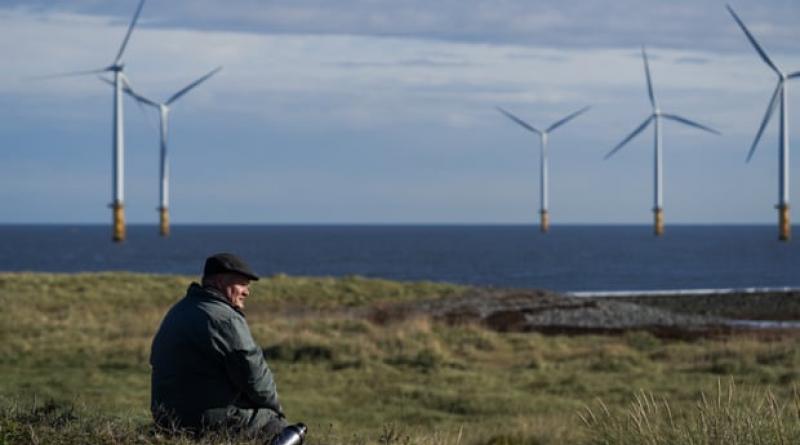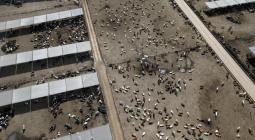Tory MPs are right: the north needs a renaissance – but it's got to be green.

Places hollowed out by deindustrialisation could be at the forefront of an environmental revolution.
Here are two news stories which may not seem linked, and yet they are. The first: a letter written this week to the prime minister by the newly formed Northern Research Group. Representing 50 Conservative MPs in northern seats – including those wrested from Labour control after generations – they rightly point to how the pandemic “has exposed in sharp relief the deep structural and systemic disadvantage faced by our own communities”, and express fear that the cost of the crisis “could be paid by the downgrading of the levelling-up agenda, and northern constituencies like ours will be left behind”.
Here’s the second story: this week, scientists revealed evidence of frozen methane deposits locked – until now – in the Arctic Ocean beginning to be released into our atmosphere. For anyone troubled by the minor matter of the gravest existential threat humanity faces, this is the cockpit alarm blaring in our ears: we can choose to ignore it, but we are still going to crash.
You see, the neglect of the north and the climate emergency are two problems in search of a common solution. A debate about how we reshape the post-pandemic economy should be welcomed, even if it is coming from the Tory benches. Across the globe, the coronavirus has underlined how states can mobilise vast resources to confront an unprecedented crisis when the will is there. While the virus has required the suppression of economic activity, the climate emergency seeks to reorientate that activity away from fatally harming the only home our species has. That means replacing the skilled, secure jobs stripped away from northern communities by deindustrialisation.
If tackling the climate crisis becomes associated with undermining jobs, then public consent will be lost. Britain is rightly lauded as a world leader in offshore wind power, which powers over 7.5m British homes a year: on current trends, it will generate a third of our electricity. But here is the catch: the components for those wind farms are built abroad – for example, as former Labour prime minister Gordon Brown highlights, in Indonesia – meaning local jobs are confined to maintenance. Combine this with justified outrage at Cumbria county council’s approval of a new mine which will create 500 jobs, and you see the problem: any economic proposals which threaten employment will test public patience.
That’s one reason why Labour’s promise in the 2019 election of a green industrial revolution must not sink with Corbynism. Tackling the climate emergency must mean a northern manufacturing renaissance. As Mika Minio-Paluello, an energy economist with Transition Economics, notes, countries such as France, Taiwan and Turkey insist that companies seeking to build wind farms there must also build factories producing nacelles – the part of the turbine housing the wind turbine’s components. “But if you look at the UK,” she tells me, “we built loads but without the jobs.” A few weeks ago, Boris Johnson announced a £160m investment package to upgrade ports and infrastructure to boost offshore wind capacity: it sounds impressive, but after years of neglect, it is not close to being adequate. To put this in perspective, a single Danish port received investment of £122m. As a Transition Economics report earlier this year concluded, £1.3bn of public investment – matched by the same amount from other sources – is what is really needed.
Transforming northern housing stock is surely another priority. “We’ve seen a good proposal in the government’s Green Homes Grant on retrofitting and insulation,” says Chaitanya Kumar, head of environment and green transition at the New Economics Foundation, “but the challenge is very few people have access to it or understand the scheme exists.”
A more ambitious insulation programme would bring down energy bills and create skilled jobs. The Northern Research Group rightly calls for priority to be given to upgrading woefully inadequate northern transport systems, including accelerating the Transpennine HS2. That needs to be coupled, too, with reversing the huge cuts to bus services: cuts by local authorities have meant well over 3,000 supported bus routes have been reduced or scrapped altogether in the last decade.
When industries vanished – some at lightning speed – in the north, it wasn’t just the communities they sustained that were injured. It’s important not to lapse into excessive nostalgia about the old world that was lost: many of these industries offered jobs that were dirty, back-breaking and inflicted long-term damage on physical health as well as spewing pollution. But those industries undoubtedly offered a sense of pride, of identity even. That loss was assiduously tapped into by the triumphant leave campaign.
Here is where Labour surely comes in. The Tories are quietly raiding Labour’s last manifesto, but drastically reducing the sums on offer and ensuring the continued primacy of the market. If Labour wants to avoid the poison fumes of culture war filling the vacuum, then it should seize the opportunity to trumpet a green industrial renaissance in the north. That means challenging the Tories on two fronts: on the scale of investment needed and on ownership.
In the last two days, Japan and South Korea have joined China in committing to respond to the coronavirus-inspired turmoil with a transformative green agenda. This must be Britain’s approach, too. Regional inequality has played a critical role in driving the political tumult of the last half decade: ex-coalfield communities and steel towns gave vent to their profound and justified sense of abandonment. We can rebuild shattered communities while serving the highest cause of all: saving our species from self-destruction.
• Owen Jones is a Guardian columnist
29 October 2020
THE GUARDIAN




